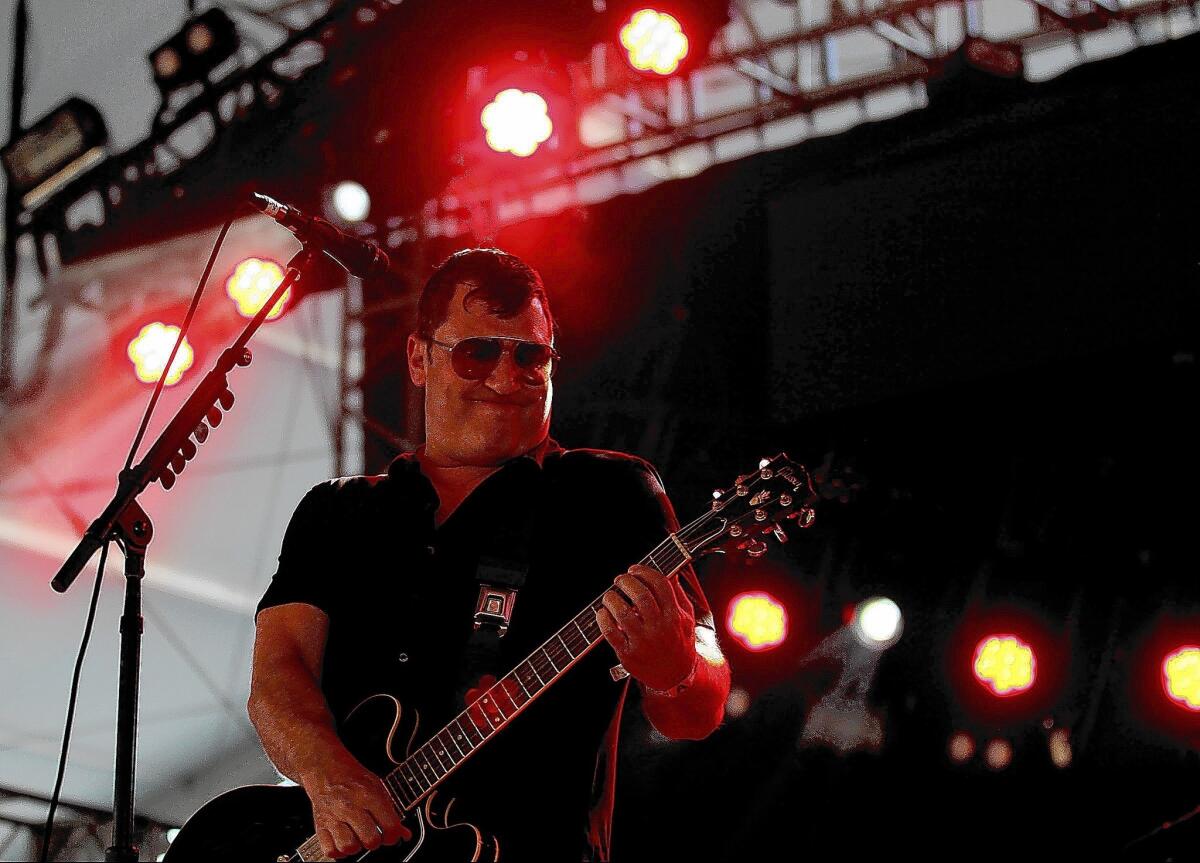R&B meets grim and grime in Afghan Whigs’ ‘Do to the Beast’

Rock ‘n’ roll has a way of romanticizing the tortured and the libertines, especially ones with a little poetry in them.
Singer Greg Dulli, whose band Afghan Whigs returns Tuesday with its first new album in 16 years, “Do to the Beast,” clearly has a cultural standing to uphold. Booked for this month’s Coachella Valley Music and Arts Festival, the indie rock veterans are the festival’s older, musically adventurous misanthropes, but misanthropes nevertheless.
Yet his reignited passion to get the old band back together came from an unlikely place.
Last year Dulli was unexpectedly asked if the Afghan Whigs would appear with Usher at the South by Southwest music festival and conference in Austin, Texas.
PHOTOS: Coachella Day 1 | Day 2 | Day 3
“We had 48 hours to put together a show with someone we had never met,” said Dulli, 48. “I had only spoken to him on the phone. There was something really thrilling about doing something quickly. For lack of a better word, it made me feel like a teenager again. It made me think we could make a record as long as we stayed that spontaneous.”
“Do to the Beast” locks into the rhythm and soul undercarriage that always set the Whigs apart from its alt-rock-era brethren, and then turns off the lights, turns up the guitars and revels in the unsavory.
“Come bedtime, come bad times,” Dulli observes on “The Lottery,” in which a soulfully aggressive rhythm holds off the tussling, constantly-building guitars. The head-pounding rings of “Parked Outside” make it feel even more uneasy, all while Dulli howls his gritted-teeth demands to “put out your innocence or you’re gonna be smoke.”
It all conjures a certain insalubrious, noir-like disposition, one Dulli was honing in his mid-20s when Seattle’s Sub Pop Records (basking in the success of Nirvana and Soundgarden) was defining the grunge sound.
PHOTOS: All of Coachella’s past headliners
Asked to describe what Dulli was like the mid-to-early ‘90s, the label’s executive vice president, Megan Jasper, presents an image that still wouldn’t be out of place in an Afghan Whigs song.
“Back in those days, when Greg was living in Seattle, he would come pick you up in this old dark green Volvo,” Jasper said. “It stunk like cigarettes. He smoked so much. But you’d sit in the car with the windows rolled down and he’d be smoking cigarettes with old Motown songs playing. It set a mood.”
Lyrically, Dulli’s songs were brutal, narcissistic theater, examinations of characters whose behavior in adult relationships was downright abhorrent. Yet cut the vicious guitars, and the Afghan Whigs were essentially a soul band, albeit one that covered the Temptations with swagger and bite.
Those strands appear on “Do to the Beast,” released by Sub Pop and overall a more muted, moody affair than the Afghan Whigs in heyday.
PHOTOS: Artists in their own words
Although bassist John Curley is the only other original Afghan Whig, a relatively open-door to policy with collaborators and guests — including singer-songwriter Joseph Arthur and trippy, psychedelic soul singer Van Hunt — lends the album a relatively free-wheeling vibe.
“Algiers,” for instance, marries a beat from “Be My Baby” with acoustic strands that recall a spaghetti western, “a Don Quixote vibe,” said Dulli, while the Hunt-assisted “It Kills” goes into more dramatic terrain led by a down-tempo piano, with Hunt asked to sing like Bobby Womack.
“I always liked their juxtaposition of Greg using a falsetto, cinnamon voice against this guitar-oriented backdrop,” Hunt said. “That has always interested me — the line between rhythm and blues and a grungier sound. It’s the sweetness of rhythm and blues against something grimier.”
Grimier is a key word, even as the Whigs enter a second, late-career phase with a nicotine-free Dulli who splits his time between Silver Lake and New Orleans.
As lyricist, Dulli is largely looking ahead — or to the end, to be more accurate. Girls, Dulli said, don’t figure too heavily into “Do to the Beast,” but the repercussions and regrets of living a life obsessed and possessed certainly do.
“As time passes, your focus shifts,” Dulli said. “Things around you change. I maybe didn’t think about death so much when I was 20, but it’s a bit more palpable these days. That was unconscious. I wasn’t trying to create a meditation on death and the afterlife, but when I listen back I realize that the passage of time figures heavily on this recording.”
More to Read
The biggest entertainment stories
Get our big stories about Hollywood, film, television, music, arts, culture and more right in your inbox as soon as they publish.
You may occasionally receive promotional content from the Los Angeles Times.











